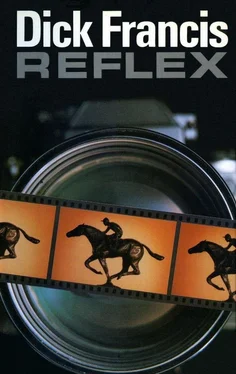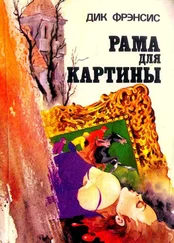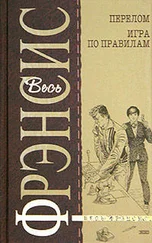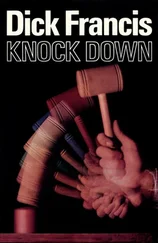My thanks to the Photographers
Bernard Parkin
and
David Hastings
and especially
RON MASSEY
who made me the puzzles.
Winded and coughing, I lay on one elbow and spat out a mouthful of grass and mud. The horse I’d been riding raised its weight off my ankle, scrambled untidily to its feet and departed at an unfeeling gallop. I waited for things to settle: chest heaving, bones still rattling from the bang, sense of balance recovering from a thirty-mile-an-hour somersault and a few tumbling rolls. No harm done. Nothing broken. Just another fall.
Time and place: sixteenth fence, three-mile steeplechase, Sandown Park racecourse, Friday, November, in thin, cold, persistent rain. At the return of breath and energy I stood wearily up and thought with intensity that this was a damn silly way for a grown man to be spending his life.
The thought itself was a jolt. Not one I’d ever thought before. Riding horses at high speed over various jumps was the only way I knew of making a living, and it was a job one couldn’t do if one’s heart wasn’t in it. The chilling flicker of disillusion nudged like the first twinge of toothache, unexpected, unwelcome, an uneasy hint of possible trouble.
I repressed it without much alarm. Reassured myself that I loved the life, of course I did, the way I always had. Believed quite easily that nothing was wrong except the weather, the fall, the lost race... minor, everyday stuff, business as usual.
Squelching uphill to the stands in paper-thin racing boots unsuitable for hiking, I thought only and firmly about the horse I’d started out on, sorting out what I might and might not say to its trainer. Discarded ‘How do you expect it to jump if you don’t school it properly?’ in favour of ‘The experience will do him good.’ Thought better of ‘useless, panicky, hard-mouthed, underfed dog’, and decided on ‘might try him in blinkers’. The trainer, anyway, would blame me for the fall and tell the owner I’d misjudged the pace. He was that sort of trainer. Every crash was a pilot error.
I thanked heaven in a mild way that I didn’t ride often for that stable, and had been engaged on that day only because Steve Millace, its usual jockey, had gone to his father’s funeral. Spare rides, even with disaster staring up from the form books, were not lightly to be turned down. Not if you needed the money, which I did. And not if, like me, you needed your name up on the number boards as often as possible, to show you were useful and wanted and there.
The only good thing, I supposed, about my descent at the fence was that Steve Millace’s father hadn’t been there to record it. George Millace, pitiless photographer of moments all jockeys preferred to ignore, was safe in his box and approximately at that moment being lowered underground to his long sleep. And good riddance, I thought uncharitably. Goodbye to the snide sneering pleasure George got from delivering to owners the irrefutable evidence of their jockeys’ failings. Goodbye to the motorised camera catching at three and a half frames per second one’s balance in the wrong place, one’s arms in the air, one’s face in the mud.
Where other sports photographers played fair and shot you winning from time to time, George trafficked exclusively in ignominy and humiliation. George was a natural-born dragger-down. Newspapers might mourn the passing of his snigger-raising pictures, but there had been little sorrow in the changing room the day Steve told us his father had driven into a tree.
Out of liking for Steve himself, no one had said much. He had listened to the silence, though, and he knew. He had been anxiously defending his father for years; and he knew.
Trudging back in the rain it seemed odd to me still that we wouldn’t actually be seeing George Millace again. His image, too familiar for too long, rose sharply in the mind: bright clever eyes, long nose, drooping moustache, twisted mouth sourly smiling. A terrific photographer, one had to admit, with an exceptional talent for anticipation and timing, his lens always pointing in the right direction at the right moment. A comic, too, in his way, showing me less than a week ago a black and white glossy of me taking a dive, nose to ground, bottom up, with a caption written on the back, ‘Philip Nore, arse high to a grasshopper.’ One would have laughed but for the genuine ill-will which had prompted his humour. One might always have at least tolerated his debunking approach but for the cruelty sliding out of his eyes. He had been a mental thrower of banana skins, lying in wait to scoff at the hurt; and he would be missed with thankfulness.
When I finally reached the shelter of the verandah outside the weighing room, the trainer and owner were waiting there with the expected accusing expressions.
‘Misjudged things pretty badly, didn’t you?’ said the trainer aggressively.
‘He took off a stride too soon.’
‘Your job to put him right.’
No point in saying that no jockey on earth could get every horse to jump perfectly always, and particularly not a badly schooled rogue. I simply nodded, and smiled a shade ruefully at the owner.
‘Might try him in blinkers,’ I said.
‘ I ’ ll decide about that,’ said the trainer sharply.
‘Not hurt, are you?’ asked the owner timidly.
I shook my head. The trainer brusquely stamped on this humane jockey-orientated enquiry and wheeled his money-source away from the danger that I might say something truthful about why the horse wouldn’t jump when asked. I watched them go without rancour and turned towards the weighing room door.
‘I say,’ said a young man, stepping in front of me, ‘Are you Philip Nore?’
‘That’s right.’
‘Well... could I have a word with you?’
He was about twenty-five, tall as a stork and earnest, with office-coloured skin. Charcoal flannel suit, striped tie, no binoculars, and no air of belonging where he stood, in the business-only section of the racecourse.
‘Sure,’ I said. ‘If you’ll wait while I check with the doctor and get into something dry.’
‘Doctor?’ He looked alarmed.
‘Oh... routine. After a fall. I shan’t be long.’
When I went out again, warmed and in street clothes, he was still waiting; and he was more or less alone on the verandah, as nearly everyone else had gone to watch the last race, already in progress.
‘I... er... my name is Jeremy Folk.’ He produced a card from inside the charcoal jacket and held it out to me. I took it, and read: Folk, Langley, Son and Folk.
Solicitors. Address in St Albans, Hertfordshire.
‘That last Folk,’ said Jeremy, pointing diffidently, ‘Is me.’
‘Congratulations,’ I said.
He gave me an anxious half smile and cleared his throat.
‘I’ve been sent... er... I’ve come to ask you to... er...’ He stopped, looking helpless and not in the least like a solicitor.
‘To what?’ I said encouragingly.
‘They said you wouldn’t like... but well... I’ve been sent to ask you... er...’
‘Do get on with it,’ I said.
‘To come and see your grandmother.’ The words came out in a nervous rush, and he seemed relieved to be rid of them.
‘No,’ I said.
He scanned my face and seemed to take heart from its calmness.
‘She’s dying,’ he said. ‘And she wants to see you.’
Death all around, I thought. George Millace and my mother’s mother. Negative grief in both cases.
‘Did you hear?’ he said.
‘I heard.’
‘Now, then? I mean, today?’
‘No,’ I said. ‘I’m not going.’
‘But you must.’ He looked troubled. ‘I mean... she’s old... and she’s dying... and she wants you...’
Читать дальше




